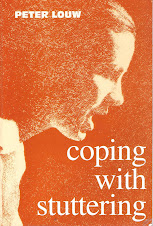Voluntary stuttering (VS) – in other words, stuttering on purpose – is a type of speech therapy taught by speech clinicians to people who stutter. It has been a major part of therapy for decades. The question that has been bothering me for many years is whether stuttering on purpose will actually reinforce stuttering over the longer term.
I have never received a satisfactory answer to this question, nor to a second which logically follows the first: have speech clinicians who have for decades promoted VS done harm to people who stutter? Is this perhaps one of the reasons why speech therapy in general has disappointed so many who stutter?
A little background. Though VS is usually linked to the therapy of Charles van Riper – probably the most influential speech pathologist of the 20th century and a stutterer himself – the technique was first introduced by Bryng Bryngelson, another pioneer of speech pathology. This was at a time when speech pathology focused on the psychological side of stuttering, emphasising the stutterer’s speaking fears and avoidance strategies, and devising ways of overcoming these. VS was seen as a method to face one’s speaking fears and avoidances. By stuttering openly and unashamedly, you advertise your stuttering to the world, thereby eliminating the need to avoid speaking situations.
Is VS the best way to advertise stuttering?
It makes sense to advertise your stuttering, so reducing the listener’s expectations of your speaking abilities. But is VS the best way to advertise your stutter?
VS is a child of its times. It really is part of a particular approach to stuttering treatment known as ‘STUTTERING MODIFICATION’, also known as ‘stutter more fluently’ therapy. Underlying this approach is the view that (1) adult stuttering can only be modified, but is seldom or never cured, so that acceptance of stuttering is emphasised; (2) that psychology plays a huge part in stuttering and its therapy; and (3) that the stutterer should never avoid speaking and stuttering, but should rather stutter openly. Stuttering modification therapy was the main stuttering therapy for many years, and is still widely practised. The main aim here is not per se to speak fluently, but to change your own mindset so that the stuttering won’t embarrass you or cause anxiety.
At a later stage, a somewhat opposing approach known as ‘FLUENCY SHAPING’, also known as ‘speak more fluently’ therapy, began to gain ground. This approach was based on later research findings in the areas of behaviorism (which suggested that stuttering is reinforced by habit), stress (which suggested that stuttering is to some extent stress-related) and physiology (which suggested a physical or neurological cause of stuttering). In this approach there is less emphasis on the psychology of stuttering. Clinicians who follow this approach focus on fluency and how to be fluent, rather than on stuttering. They say that a large measure of fluency is indeed a realistic aim for adult stutterers; that much of stuttering is physical; that stutterers can improve their speech by using fluency techniques; and that these techniques must be reinforced by practising, i.e. by making it a habit.
Some stutterers do benefit from VS
From the above it should be clear that BOTH approaches have merit. Stuttering is a complex mixture of psychology, physiology, stress and habit. But where does this leave VS – particularly when you believe, as I do, that stuttering is inter alia partly stress-related and partly a conditioned habit, REINFORCED EVERY TIME WHEN YOU STUTTER? And do you reinforce and strengthen your stuttering when you stutter on purpose?
The fact is, however, that many stutterers have found VS to be helpful. How can this be explained?
Anecdotal feedback from stutterers who do VS indicates that stuttering on purpose can be useful in various ways, eg. in making your stuttering known to the listener in situations where it is impractical or inappropriate to declare upfront that you stutter. Some stutterers also find that VS helps them in turning a major block into a lighter, manageable repetition.
You might argue that these benefits should conclude the matter. After all, if some (brave) people benefit from VS, it has value. But then again – many well-known treatments have short-term benefits, but cause long-term harm. Is VS a seemingly beneficial approach which in fact perpetuates stuttering by locking you forever into the habit?
Sabotaging the fluency you already have?
The fact is that many stutterers reject VS intuitively without ever trying it; and some reject it after finding it an embarrassing experience. Logic also tells us that those who are by nature introvert will find it hard to stutter on purpose. Those who are situational stutterers (i.e. who only stutter in certain situations) and who do have a measure of fluency may feel that it doesn’t make sense to sabotage the measure of fluency they already possess. And for the many stutterers whose speech is much affected by stress, VS could simply increase their tension levels, thereby turning artificial stuttering into real stuttering.
That VS and stuttering modification is not successful in improving speech permanently has to some extent been confirmed by research done on the 3.5 week Successful Stuttering Management Program (SSMP), which offers modification therapy. (Source: page 155 of the online book No Miracle Cures, by T.D. Kehoe.)
In his very readable book on page 156, Kehoe also reminds us that the goals of stuttering modification therapy are to reduce speech-related fears and anxieties, and not to attain fluent speech. To that I would reply: surely there are other ways to reduce these fears (eg. gradual stress desensitisation via fluency shaping) without exposing people to the possible long-term negative effects of VS?
My own view, in conclusion, is that VS should be handled with caution, taking note of its benefits but also the potential long-term negative effects.







No comments:
Post a Comment